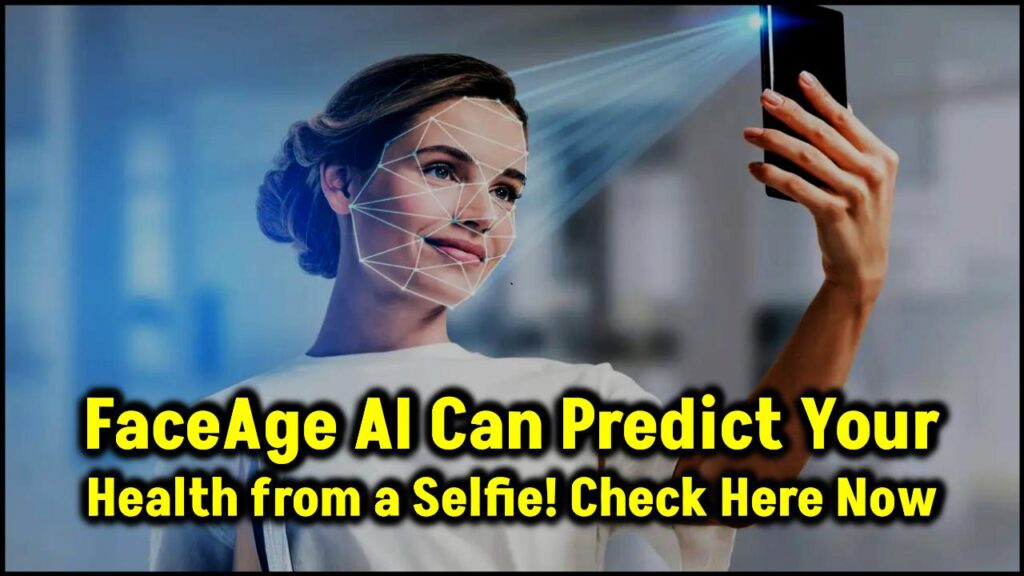FaceAge AI Can Predict Your Health: In a world where smartphones are practically extensions of our bodies, FaceAge AI is transforming the humble selfie into a powerful health diagnostic tool. Developed by researchers at Mass General Brigham and Harvard Medical School, FaceAge AI uses advanced artificial intelligence to predict your biological age—not just how old you are on paper, but how healthy your body really is. All it takes is one photo. That’s right: with just a selfie, FaceAge AI can assess subtle signs of aging, help identify health risks, and even predict survival outcomes for cancer patients. This revolutionary technology is changing how we think about aging and disease, and it’s opening new doors for both personal health awareness and clinical care.

FaceAge AI Can Predict Your Health
| Topic | Details |
|---|---|
| What is FaceAge AI? | AI tool that predicts biological age from a selfie |
| Developed by | Mass General Brigham & Harvard Medical School |
| Training Data | 58,000+ healthy faces, 6,000+ cancer patient images |
| Main Benefits | Estimates biological age, predicts cancer survival, aids clinical planning |
| Accuracy | 80% (better than doctors at 61% using photos alone) |
| Key Feature | Uses facial features like wrinkles, symmetry, and skin texture |
| Official Website | Mass General Brigham |
FaceAge AI represents a significant leap in how we assess health. By translating facial features into actionable health insights, it brings us closer to truly personalized medicine. While still in its early stages, the potential for widespread health monitoring, early disease detection, and improved care planning is huge. As with all technology, ethical deployment and transparency will be key. But one thing’s clear: in the age of selfies, your face might just be the window to your well-being.
What Is FaceAge AI and How Does It Work?
At its core, FaceAge AI is a deep learning model trained to estimate your biological age by analyzing facial features. This is not your typical age-guessing app. It’s a medical-grade algorithm built using data from tens of thousands of individuals—healthy and ill.
Trained to Recognize More Than Skin Deep
The AI was trained on:
- 58,000+ photos of healthy individuals
- 6,000+ images of cancer patients By analyzing features such as:
- Skin texture
- Facial symmetry
- Wrinkles and sagging It can estimate how much wear and tear your body shows—even if you feel just fine.
Why Biological Age Matters
Your chronological age is the number of years you’ve been alive. But your biological age is a more accurate reflection of how your body is aging internally. For example, two people who are both 50 years old may have drastically different health statuses:
- One may have a biological age of 40 (a sign of good health and longevity)
- The other may be biologically 60 (increased disease risk and slower recovery) FaceAge AI helps reveal these hidden differences with just a snapshot.
Real-World Accuracy: FaceAge in Clinical Settings
FaceAge AI is more than just fascinating—it’s clinically effective. Here are the numbers:
- Cancer patients appeared 5 years older biologically than their real age on average.
- In survival predictions for terminal cancer patients, FaceAge achieved 80% accuracy—far outperforming physicians, who were right only 61% of the time when judging by photos alone.
Source: Mass General Brigham These findings indicate that FaceAge AI could be used to guide treatment decisions based on a patient’s underlying biological resilience.
Ethical Considerations and Limitations
While this technology is exciting, it’s not without its concerns:
1. Privacy and Consent
- Facial data is personal and sensitive. Safeguarding it from misuse is essential.
- Researchers stress that FaceAge AI is used only in controlled research environments for now.
2. Bias in Training Data
- AI models can reflect the biases in their training sets. If most photos used were of certain ethnic groups, the model may be less accurate for others.
- Developers are working on expanding and diversifying the dataset.
3. Not Yet for Consumers
- FaceAge is not available to the public.
- Similar wellness apps exist, but none are as rigorously validated for clinical use.
How This Technology Might Shape the Future
FaceAge AI hints at a future where health screening could become as easy as taking a selfie. Imagine apps that:
- Alert you when your biological age starts creeping ahead of your actual age
- Recommend lifestyle changes or medical tests
- Help insurers or doctors personalize your care Though FaceAge is still in the lab, the consumer tech industry is already exploring related tools for skincare, longevity, and preventive health.
OpenAI’s HealthBench Dataset Establishes New Standards for AI Safety in Healthcare.
FAQs about FaceAge AI Can Predict Your Health
1. Is FaceAge AI available as a mobile app?
Not yet. It is currently being used in research and clinical trials. However, similar consumer-focused tools are being developed.
2. Is it safe to share facial data with AI tools?
Only share data with reputable, HIPAA-compliant or medically approved platforms. Privacy laws are evolving to protect users.
3. Can FaceAge AI detect specific diseases?
Not directly. It estimates biological age and health risk, which can correlate with disease presence or progression.
4. Is biological age reversible?
Yes. Lifestyle changes like better sleep, diet, exercise, and reducing stress can lower biological age.
5. Will doctors start using this in regular checkups?
Possibly in the future. More validation is needed, but the tool shows promise for integration in cancer care and wellness planning.





